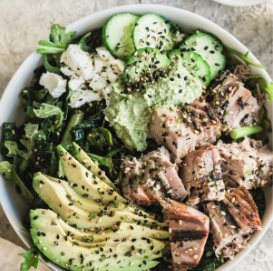
An avocado is a bright green fruit with a large pit and dark leathery skin. It’s also known as alligator pear or butter fruit. Avocados are a source of key nutrients, including healthy fats and fiber. They’re turning up in everything from salads and wraps to smoothies and even brownies. So, what exactly makes this pear-shaped berry such a superfood?
Avocado Benefits
A healthy lifestyle that includes nutritious foods can help prevent and reverse disease. Avocados are a healthy food you can add. The vitamins, minerals, and healthy fats you get from avocados help prevent disease and keep your body in good working order. Avocados may help ward off:
Cancer. The folate you get from avocados may lower your risk of certain cancers, such as prostate and colon cancer. Nutrients in avocados may also treat cancer.
Arthritis and osteoporosis. Studies on oil extracts from avocados show they can ease symptoms of osteoarthritis, a kind of arthritis caused by the wear and tear of cartilage and bones. The vitamin K in avocados boosts your bone health by slowing down bone loss and warding off osteoporosis, a disease that weakens your bones and makes them more fragile.
Depression. Research shows a link between depression and low levels of folate. Folate helps block the buildup of a substance called homocysteine in your blood. Homocysteine slows down the flow of nutrients to your brain and speeds up depression. The high levels of folate in avocados may help keep depression symptoms at bay.
Inflammation. Chronic inflammation can kick off many diseases, including diabetes, Alzheimer’s disease, and arthritis. The vitamin E in avocados lowers inflammation in your body.
The nutrients in avocados can also help maintain healthy:
Digestion. Avocados are packed with fiber. They’re especially high in insoluble fiber, which is the kind that helps move waste through your body. Fiber keeps your bowel movements regular and can prevent constipation.
Blood pressure. Avocados are rich in potassium. Potassium helps level out your blood pressure by lowering sodium levels in your blood and easing tension in your blood vessel walls.
Heart function. Most of the healthy fat in avocado is oleic acid, a monounsaturated fatty acid. This heart-healthy fat helps lower inflammation in your heart and blood vessels. Avocados also have a nutrient called beta-sitosterol, the plant version of cholesterol. Beta-sitosterol helps lower your cholesterol levels.
Vision. Lutein and zeaxanthin are two antioxidants in avocados that are good for your eyes. They help protect the tissues in your eyes from UV light damage and help prevent both cataracts and macular degeneration.
Pregnancy. You need at least 400 micrograms of folate a day during pregnancy to help prevent birth defects in your baby’s brain and spine. One avocado gives you around 41% of that.
Avocado Toast

Avocado on whole-grain toast is the simplest example of avocado toast. But there are many varieties to try during your next breakfast. Adding vegetables and other toppings is a great way to change things up.
Lemon olive oil avocado toast. For an Italian-inspired avocado toast, try adding a squeeze of lemon juice, some olive oil, and Italian herb seasoning to the top of your avocado toast.
Tex-Mex avocado toast. For a twist on Tex-Mex cuisine, add tomato, black beans, and cilantro to your avocado toast. You can also add a Greek yogurt sauce that includes Greek yogurt, milk, cumin, and pepper.
Everything bagel avocado toast. For this variation, you’ll need everything bagel seasoning and whichever toppings you’d like. Once you’ve toasted your bread, add your avocado and toppings, then sprinkle a good amount of everything bagel seasoning on top for some extra flavor. This seasoning tends to be salty, though, so you don’t need to add extra salt.
Dill salmon avocado toast. Adding salmon to your avocado toast can make your breakfast a protein-packed meal. Add chopped dill, a drizzle of Greek yogurt, cucumber, and radish for flavor.
Loaded avocado toast. This recipe uses radish, green onion, jalapeno, and toasted sunflower seeds. Add this mixture to your avocado toast and have a flavorful breakfast.
Mint goat cheese avocado toast. On top of your whole-grain crispy bread, add sliced avocado, soft goat cheese, and some fresh mint leaves. To add more flavor and crunch, throw in some thawed peas, roasted almonds, and a pinch of salt and pepper.
Blueberry flaxseed avocado toast. You can sprinkle blueberries, flaxseeds, or hempseeds on your avocado toast for a sweeter option. Even adding a drizzle of honey can add some extra sweetness.
Energy Boost Avocado salad

Ingredients:
1 small sweet potato, peeled and cut into cubes
2 cups baby spinach
1/4 cup cilantro, chopped (if you like it. I don’t, so I skip it! )
1 avocado, peeled, remove pit and cut into cubes
1 cup cherry tomatoes, cut in halves
1 small yellow onion, chopped
2 garlic cloves, minced
2 tablespoons extra virgin olive oil
1 teaspoon coriander
1 teaspoon Chile Lime Seasoning blend (if you can’t find the seasoning , use juice of one lime, 1 teaspoon paprika and 1 teaspoon ground chili pepper)
Sea salt to taste
Directions:
Steam sweet potato for 10 minutes or until tender, set aside.
Heat a pan with olive oil, sauté garlic and onion, add coriander, chile lime seasoning, salt and pepper, stir to mix well.
Add the spinach, cilantro and cherry tomatoes, stir to mix well, remove from the pan immediately to avoid overcooking.
Top with fresh avocado.
How to store avocados
Store avocados at room temperature, keeping in mind that they can take 4-5 days to ripen.
Wash them before cutting so dirt and bacteria aren’t transferred from the knife onto the pulp.
While guacamole is arguably the most popular way to eat avocado, you can also puree and toss with pasta, substitute for butter or oil in your favorite baked good recipes, or spread or slice onto sandwiches.
When ordering at a restaurant, remember that not all avocado dishes are created equal. Some items, like avocado fries and avocado egg rolls, are coated in batter and fried, making them much higher in calories and fat.
How to freeze avocados
Peel. First, cut the avocado and remove its hard outer skin. Also, make sure you remove the pit from the middle. Freezing an avocado whole won’t yield great results because it’ll be harder to take apart after it’s frozen.
Avocado Oil
Avocado oil is pressed from the avocado fruit. Its mild taste and high smoke point make it a popular cooking oil, but you can also consume it raw. Avocado oil is very similar to olive oil in terms of utility and nutritional value. Like extra virgin olive oil, cold-pressed avocado oil is unrefined and retains some of the flavor and color of the fruit, leaving it greenish in color.
Avocado oil is also often put on the skin as a moisturizer and can be found in many cosmetics and skin care products. When produced for use on the skin, the oil is usually refined and bleached, giving it a pale-yellow color.
Avocado oil nutrition
One tablespoon of avocado oil contains:
Calories: 124
Protein: 0 grams
Fat: 14 grams
Carbohydrates: 0 grams
Fiber: 0 grams
Sugar: 0 grams
Avocado oil is a good source of:
Oleic acid
Vitamin E
Monounsaturated fat
Avocado Nutrition Facts
Avocado calories
Avocados have a lot of calories. The recommended serving size is smaller than you’d expect: one-third of a medium avocado (50 grams, or 1.7 ounces). One ounce has 50 calories.
Avocados are high in fat. But it’s monounsaturated fat, which is “good” fat that helps lower bad cholesterol as long as you eat them in moderation.
Avocados offer nearly 20 vitamins and minerals. So, in a 100-gram serving, you get:
485 milligrams of potassium
81 micrograms of folate
0.257 milligrams of vitamin B6
10 milligrams of vitamin C
2.07 milligrams of vitamin E
Avocados are low in sugar. And they contain fiber, which helps you feel full longer. In one study, people who added a fresh avocado half to their lunch were less interested in eating during the next 3 hours than those who didn’t have the fruit.
Avocado Allergy
If you have a latex allergy, talk to your doctor before adding avocado to your diet. People with a serious allergy to latex may also have symptoms after eating avocado. You may also hear this called latex-food syndrome or latex-fruit allergy.
Latex products are made from a protein in the sap of the Brazilian rubber tree (Hevea brasiliensis). Avocados have a very similar protein, which is what causes the allergic reaction. Your symptoms could be mild, or they could be serious. They can also get worse each time you have an avocado.
Takeways
Avocados are actually a berry, not a vegetable. They’re high in fat, but it’s monounsaturated fat, which is healthy as long as you don’t eat too much of it. The recommended serving size is one-third of a medium avocado. Research suggests eating avocados might help prevent cancer, arthritis, depression, and inflammation. They also contain fiber, potassium, and folate, among other important nutrients. Oil pressed from avocados is a neutral cooking oil; it’s also used in cosmetics.
Avocado FAQs
Is it OK to eat an avocado every day?
A daily dose of avocado is good for your heart. Research has shown that people who eat avocados every day have higher levels of HDL, the “good” cholesterol. Avocados also may be good for your gut biome. But they’re high in calories, so stick to recommended serving sizes.
Is avocado a fruit or protein?
According to botanists – experts who study plants – avocados should be classified as fruit, because they have a fleshy part that we eat surrounding a seed or seeds. Tomatoes, cucumbers, and green peppers are other examples of things that are botanically fruits, though the way we use them in the kitchen is more in line with vegetables.
Do avocados burn belly fat?
Burning belly fat – an example of what experts call “spot reduction” – is a weight loss myth. Where your body stores fat is a function of genetics and other factors. You can focus on losing weight overall. But there’s no specific diet or food that targets just your belly.
How many calories are in an avocado?
One medium avocado has about 240 calories.
How much protein is in an avocado?
One avocado has about 4 grams of protein.
How many carbs are in an avocado?
One avocado has about 17 grams of carbohydrates.
Source:
WebMD
Healthline
